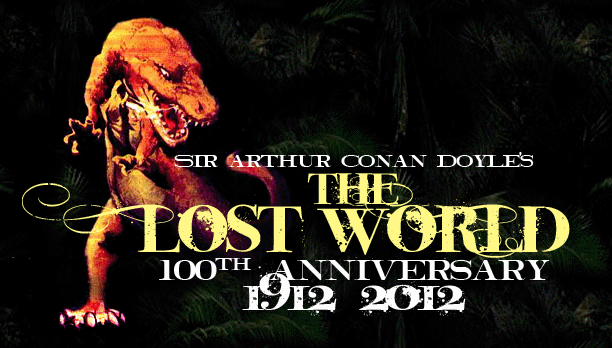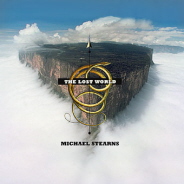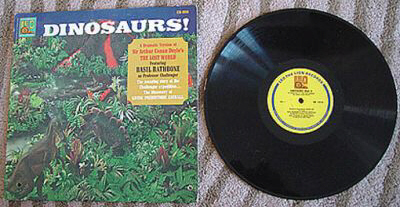

|
One of the most original aural explorations was a 1995 New Age music recording by Michael Stearns, which was inspired both by Doyle's story and Mount Roraima in Venezuela. Mixing the technical aspects of modern music with the sounds and voices of Venezuela, his Lost World supplied a serene and sometimes operatic work. Accustomed to composing ambient soundtracks for such films as Baraka (1992) and Chronos (1985), Stearns brings much the same sensibility to this "soundtrack" for the novel and Gran Saban region. Of it, Stearns said: "Whenever I have gone out hiking or backpacking, I always enter into that childhood space of searching for a 'Lost World'. It lives as a place within all of us, and with the expansion of the modern world, it gets harder and harder to find. In 1994 I traveled to The Lost World (El Mundo Perdido) in the south of Venezuela. This is the area that Sir Arthur Conan Doyle wrote about in his book 'The Lost World'. The music on this album was inspired by the sights and sounds, the stories that I heard, and the experiences I had while exploring this area. Some of them stretched me into the unknown and revealed what is very hard to describe in words... easier to evoke with music. Many of the sounds I collected there are woven into the musical fabric of this CD."

|
 Over the course of its history, The Lost World has enjoyed numerous audio adaptations, from gramophone to radio to cassette to compact disk. The first of these was the sheet music and associated record written by Rudolph Friml and Harry B. Smith, “inspired by” the original 1925 film. The majority, however, have been audio-book versions of the stories, including some read by luminaries like James Mason, Richard Burton, and Basil Rathbone. Rathbone, interestingly enough, is perhaps most famous for playing Sherlock Holmes in feature films of the 1940s. BBC radio produced iconic radio plays of the classic tale in 1938, 1944, 1949, 1952, 1958, and 1975. They also adapted The Poison Belt for radio in 1944 and 1949. BBC Spoken Word/Cover to Cover released another audio version read by Matthew Rhys, the actor for Malone in the BBC's mini-series, in conjunction with that same program. This 2001 release was distributed online for free in 2009 as part of the Edinburgh UNESCO City of Literature Lost World Read 2009 campaign. Actor Brian Blessed, whose lifelong love affair with The Lost World led him to scale Mount Roraima (but has yet to get him cast as Professor Challenger, even as he is one of the most perfectly suited actors for the role), described in his autobiography Quest for the Lost World the canings he received at school as a boy on behalf of a BBC radio play. A 10-part serial ran up to school time, causing him to be constantly late for classes: Slowly he lifted the cane to a great height and brought it down viciously on my right hand. The pain was excruciating but I kept my face straight. Twice more he hit that hand and then administered three more blows to the other.In the 1980-81 season, Radio New Zealand produced a 3-part dramatization of The Lost World. Produced by Peggy Wells and Barry Campbell, this version starred the late Terrence Cooper as Professor Challenger and was complete with incidental score and dinosaur audio effects. Sources say that this was a very good version of the novel, and actually makes an interesting footnote as the first time Conan Doyle's tale ventured to New Zealand, as it did again for the BBC's television production, which was filmed in this stunning environment.
The company itself grew out of a performance of the Orson Welles/Howard Koch version of War of the Worlds for LA Theater Works, starring Nimoy, Brent “Data” Spiner, Gates “Dr. Crusher” McFadden, Wil “Wesley Crusher” Wheaton, Dwight Schultz, Armin “Quark” Shimmerman and others. Finding interested partners in deLancie and Segaloff, Nimoy and co. pursued their love of classic Science Fiction and a desire to bring that to audiences. DeLancie wrote: Leonard, Nat and I have talked quite a bit about what we want to accomplish with Alien Voices, and much of our discussion is motivated by our feeling that modern SF has gotten away from the philosophy that attracted people to the genre in the first place. Most classic SF holds great hope for technology and humanity. Both Wells and Verne were visionaries. Verne, in particular, conceived a wide range of inventions he felt would help resolve the world's problems. I've always found it unfortunate that SF literature is generally pooh-poohed. In his day, Verne's writings were considered "boy fiction," a dismissive term that persists today. But, as we all know, boys (and girls) grow up and carry with them many of the ideas and hopes that they first discovered in their adolescence.Their first two productions as Alien Voices were W.G. Wells' The Time Machine and Jules Verne's Journey to the Centre of the Earth. These were popular enough to warrant a third, being Sir Arthur Conan Doyle’s The Lost World. Unlike most audio-books, which at most condense the written novel’s material into a listenable duration, Alien Voices’ The Lost World is a true dramatization, with numerous divergences from the source material. The story still focuses on newspaperman Ned Malone (played by Dwight Schultz) attempting to win the hand of the fair Gladys by joining eccentric Professor Challenger’s (Armin Shimmerman) expedition into South America to find living dinosaurs. Roxton (deLancie) signs up, but instead of adding a new love interest as previous adaptations have done, Alien Voices chose to transform Prof. Summerlee into a woman (played by Roxann “B’Elanna Torres” Dawson). There are also minor (but surprisingly irritating) palaeontological errors, such as the misidentification of Megalosaurus as Megalodon, which was a real prehistoric creature… A species of the giant Cenozoic shark Carcharodon. However, the Alien Voices production is also notable for the courageous choice not to downplay or write out the most questionable elements of the original story. Gomez, for instance, still maroons the expedition on the plateau and is still executed in retribution by Roxton. The war against the ape men is also accounted for, with a mix of emotions from the participants. In the basic thrust of the action, this dramatization follows the novel quite closely. Unlike previous Alien Voices productions which were recorded in a studio, The Lost World was performed in front of a live audience of over 1000 at the Creation Entertainment Grand Slam V Star Trek Convention in 1997 in Pasadena, California. It was also performed on television, as an audio-dramatization rather than a film adaptation, for the Sci-Fi Network. Alien Voices went on to produce and perform The Invisible Man and The First Men in the Moon for Simon and Schuster Audio and the Sci-Fi Network before essentially admitting defeat in 1999 and 2000 with Spock vs. Q and Spock vs. Q: The Sequel. Though New Line Television picked up the option to produce actual Alien Voices film adaptations, this potential was never realized.
Review by Cory Gross, excerpted from an upcoming paper to be published in a centenary edition of the novel.
|